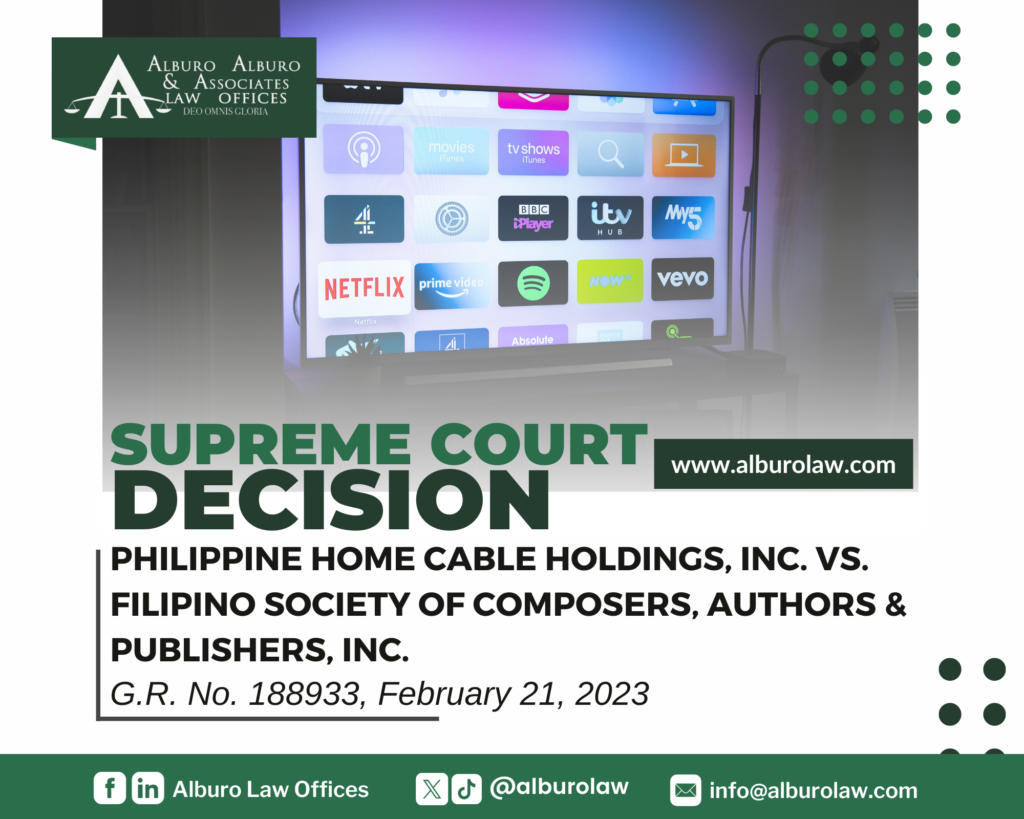
Photo from Unsplash | Nicolas J Leclercq
The following post does not create a lawyer-client relationship between Alburo Alburo and Associates Law Offices (or any of its lawyers) and the reader. It is still best for you to engage the services of a lawyer or you may directly contact and consult Alburo Alburo and Associates Law Offices to address your specific legal concerns, if there is any.
Also, the matters contained in the following were written in accordance with the law, rules, and jurisprudence prevailing at the time of writing and posting, and do not include any future developments on the subject matter under discussion.
AT A GLANCE:
The court clarified that copyright infringement occurs when an unauthorized party exercises economic rights, including communication to the public, without consent. Filscap, accredited to enforce copyright, had valid standing to sue. The court noted that Home Cable’s broadcast of music through cable TV constituted a public communication of copyrighted works.
Home Cable’s defense, citing a previous case involving cable retransmission, was rejected because it did not align with the nature of the agreements in this case. The court emphasized that copyright infringement for communicating works to the public is distinct from other forms of retransmission and reiterated that the copyright holder’s rights remain intact even if works are used in derivative formats.
Home Cable, a company specializing in cable television, entered into agreements with Precision Audio Video Service, Inc. (Precision Audio) for distributing and airing videoke laser discs and operating additional channels. Precision Audio assured Home Cable that it held full copyrights and necessary permits for the laser discs.
Filipino Society of Composers, Authors and Publishers, Inc. (Filscap) discovered that Home Cable was broadcasting its members’ and affiliates’ musical compositions on certain channels without a license. Filscap requested that Home Cable obtain a license and pay the appropriate fees. When Home Cable continued broadcasting without a license, Filscap filed a complaint for injunction and damages.
The Regional Trial Court (RTC) found Home Cable guilty of copyright infringement. However, the Court of Appeals (CA) modified the decision, stating that there was no basis for actual damages. Filscap subsequently filed a Petition for Review on Certiorari with the Supreme Court (SC).
Under the Intellectual Property Code, literary and artistic works, including audiovisual works like videoke, are protected from creation. Copyright encompasses various economic rights, such as reproduction, public distribution, public performance, and communication to the public.
Filscap, a collective management organization for composers, authors, and publishers, found Home Cable broadcasting its copyrighted musical compositions without a license. Filscap argued this constituted copyright infringement and sought damages.
The court clarified that copyright infringement occurs when an unauthorized party exercises economic rights, including communication to the public, without consent. Filscap, accredited to enforce copyright, had valid standing to sue. The court noted that Home Cable’s broadcast of music through cable TV constituted a public communication of copyrighted works.
Home Cable’s defense, citing a previous case involving cable retransmission, was rejected because it did not align with the nature of the agreements in this case. The court emphasized that copyright infringement for communicating works to the public is distinct from other forms of retransmission and reiterated that the copyright holder’s rights remain intact even if works are used in derivative formats.
The Supreme Court denied Home Cable’s petition, affirming that the infringement was correctly identified and that Filscap’s role and claims were valid.
Source:
Alburo Alburo and Associates Law Offices specializes in business law and labor law consulting. For inquiries regarding taxation and taxpayer’s remedies, you may reach us at info@alburolaw.com, or dial us at (02)7745-4391/0917-5772207.
All rights reserved.

